This post is the first in a series of posts on how to support grieving families going through infant loss. This post covers how to provide support in the immediate aftermath. Soon we will also post about giving support to families in the longer term as well. I would love to hear your thoughts on this, especially those of you who have walked this path and have experiences to share. <3
This post may contain affiliate links, which means if you make a purchase through my links, I may receive a small commission at no extra cost to you.

Hi! I’m Becca, an extroverted, Jesus-loving, coffee-obsessed wife and homeschooling mom of 3 boys with a passion for all things related to birth. (I also happen to be Mama Shark’s sister.)
My Story of Support during Infant Loss
This past October, I shared about the birth, NICU stay, and death of my second baby boy, Edison. Now, I’ll be writing a short series of posts designed to provide resources for those who may have friends experiencing similar circumstances.
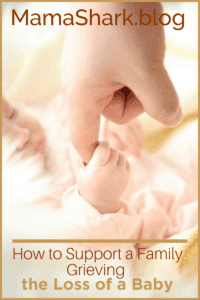
The sobering statistic is that up to 1 in 4 pregnancies will end in either miscarriage, stillbirth, or infant death. While my experience certainly does not make me an expert on each person’s unique pathway of suffering and grief, I am in the blessed position of being so well-loved through my grief that I want to share with others the way they can treat their loved ones in similar ways.
Today, I’ll be focusing on ways to provide support to a family in the direct aftermath of their baby’s death (or potentially even during a medically tenuous hospital stay). In the future, I will be addressing ideas for the first year after baby loss, and then continued ways to support through the following years.
Each of these suggestions may not apply to every situation, as every circumstance is unique. Perhaps they will provide inspiration for a creative way to show love that is even more specific to someone else’s suffering.

How to Support Grieving Families going through Infant Loss: An Attitude of Support
To begin, I don’t plan to go into a large list of “say this, don’t say that” – I think there are already plenty of articles with such suggestions available. However, I highly recommend reading about the “Ring Theory” for interacting with people experiencing any type of major trauma or crisis. I strive to keep these principles in mind when friends are facing hard times.
The gist of the Ring Theory is that you only get to complain, whine, or talk about yourself and your difficulties to people who are farther away from the relational epicenter of the crisis than you. For example, if you’re family, you can dump your emotions on your own friends.
But if you are, for example, a friend of a friend, you don’t get to jump in with your story of your own suffering. You provide comfort and service to those closer to the difficult situation while finding someone less connected than you to do your own emotional processing.
With that foundation in mind, the following are several ideas of ways to be truly helpful when a friend or family member is facing the loss of a baby.
How to Support if there is a NICU Stay or Other Medical Circumstances
In our specific circumstances, we had 13 precious days with Edison in the NICU before he passed away. One of the most priceless gifts that we were given during his life was the gift of time with him. Due to the selfless kindness of many family members, my husband Kyle and I were free to spend almost every waking moment with Edison.
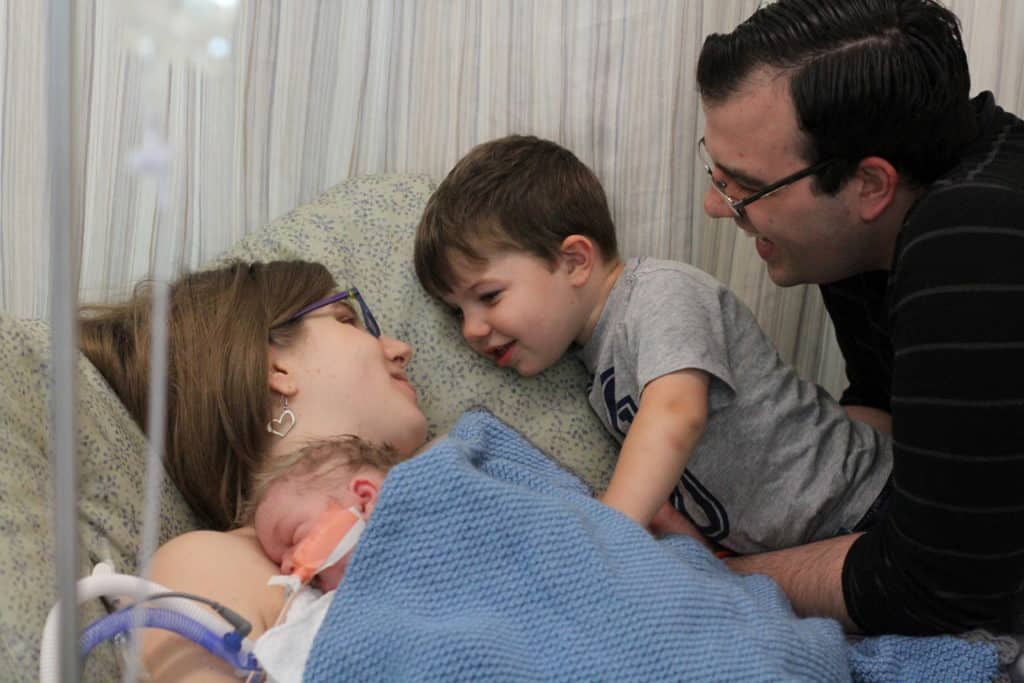
The Gift of Time
Our older son, Quentin, was a few months away from being 3 at the time of Edison’s birth. Keeping track of a rambunctious and precocious 2 year old all day is hard work for anyone, but throw in a massive dose of personal trauma, grief, confusion, and concern and it becomes a gargantuan task.
Somehow our family pulled it off, though, and Kyle and I still cry about how grateful we are for this gift. Friends of mine jumped in to relieve our family, too, taking Q back to their own homes or out for play dates.
So, if you are close enough to the family to offer, providing childcare for other children is giving the parents the gift of time with their fragile baby.
If they don’t have older children, other ways to provide the gift of time include taking care of family pets and household tasks. Go through their fridge and throw out spoiled food. Wash their dirty laundry. Mow their grass. Clean their bathrooms. Anything that eases the burden of the “everyday” frees up their energy and mental space to allow them to create memories with their baby. (Note: if a nursery or special space in the house is set up for the baby, do NOT touch it unless this is specifically requested. The family will deal with those things in their own way, in their own time.)

Emotional Gatekeeping
Another potential way to serve the family during a hospital stay or other time of medical uncertainty is what I have decided to term “emotional gatekeeping”. I will preface that this is a role that should be reserved for someone very, very close to the parents. In my case, my dear sister (yep, Mama Shark herself) volunteered to be the contact point for extended family and friends on our behalf.

Examples of emotional gatekeeping include things like the ubiquitous Facebook updates, responding to texts, and warding off well-intentioned people with inappropriate questions.
I would provide Stephanie with daily updates that she could post for us, and I passed along her number to people who wanted information that I wasn’t emotionally prepared to share. It takes a surprising amount of time and mental energy to engage in conversation with even the most well-meaning friends and family. So, by alleviating that burden, Stephanie once again allowed us to have more time with Edison.
Offering to run a private Facebook update group (which another kind friend did for us), to be a contact point for disseminating appropriate information, or to find the tactful ways to say “that’s a question that the family is choosing not to answer right now” are ways to be an emotional buffer for a family with a baby facing medical difficulties.
Tangible Gifts
From a more tangible perspective, there are also some things that can be helpful to the family during a hospital stay. A basket of snacks is always a great go-to gift. Since I was freshly postpartum and pumping for Edison, an especially appreciated snack option was lactation cookies (but, obviously that might not be an appropriate gift in all circumstances).
Small gifts for older children can be a helpful way to keep them entertained. Someone sent a set of magnetic blocks for Quentin, and he and his cousin played with those for hours in the waiting room.

With the family’s permission, arranging for a newborn photographer to come and take family pictures can also be a priceless gift. Some photographers offer free or discounted NICU or bereavement sessions – it is always worth it to ask. Aside from our memories of the time spent with Edison, the pictures that we have with him are some of our most cherished treasures.
Like our experience with Edison, it is a grave reality that families sometimes leave the hospital for the last time without their baby in their arms. In those circumstances, they desperately need the care and support of their community. Here are a variety of ways to express support for a family going through the death of their precious baby in the immediate aftermath of the loss.
Support for Grieving Families going through Infant Loss: Come to the Funeral/Visitation
If a family chooses to have services for their baby, make it your priority to attend. Rearrange your schedule. Book childcare. Drive a couple hours. I have no idea who attended my wedding aside from the major players (and it was only 7 years ago). On the flip side, I have a very distinct memory of those who came to Edison’s visitation and/or funeral services. Wedding day? Let’s face it, you want people there, but at the end of the day it’s all about you and your spouse. But a funeral? It’s all about your community showing up as a physical expression of their love and support.
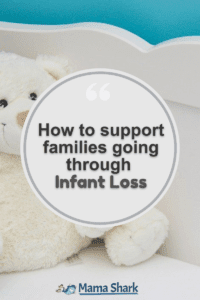
As we stood in the cemetery at the end of Edison’s burial service, I found myself engulfed in a massive group hug. I don’t know who was the first to embrace me, but before I knew it I was in the center of at least 15 loving, crying, supporting women. And they just held me as I sobbed. Their physical presence was a silent promise, assuring my broken heart that I would not be allowed to suffer this loss alone.
I understand that visitations are full of standing in long lines and not knowing what to say. Especially in the case of the death of a baby, it can be awkward, heartbreaking, and confusing. Funerals also don’t really live up to that “fun” part of their name. However, attending these types of events shows your shared grief at the loss of their precious baby as well as your intentions to continue to provide the support they so desperately need.
Alternatively, one other way to serve the family during their baby’s services is to provide childcare for their other children, if applicable. There were many friends that I know would have been willing to watch Quentin during Edison’s visitation and funeral, but I really wanted them to be present at those services.
Mercifully, a couple of his favorite childcare workers from a community organization contacted a mutual friend to offer to watch him. They will probably never know the extent of the blessing that it was for Kyle and I to once again know that Quentin was in the best of hands while we were free to grieve with our close family and friends.

Creative Ways to Show Support for Grieving Families going through Infant Loss
After the hospital stay was complete and the funeral was over, one of the most beautiful things that we experienced in those first few months following Edison’s life and death were the sheer number of different ways that people expressed their support for our family.
Sometimes, when faced with a tragic situation, it can be easy to think that you have nothing of value to offer. Perhaps you aren’t a good cook, or you live hundreds of miles away, or you’re insanely busy, or you’re on a tight budget.
Those are all very valid circumstances – but there’s pretty much always a way that you can help, and often the way you help will be uniquely useful and relieve a burden that someone else cannot. It takes all types of help to support a family facing the loss of their baby.
Following are some suggestions of ways to show love and support for grieving families going through infant loss, many of which are drawn directly from my experience of being well-loved.
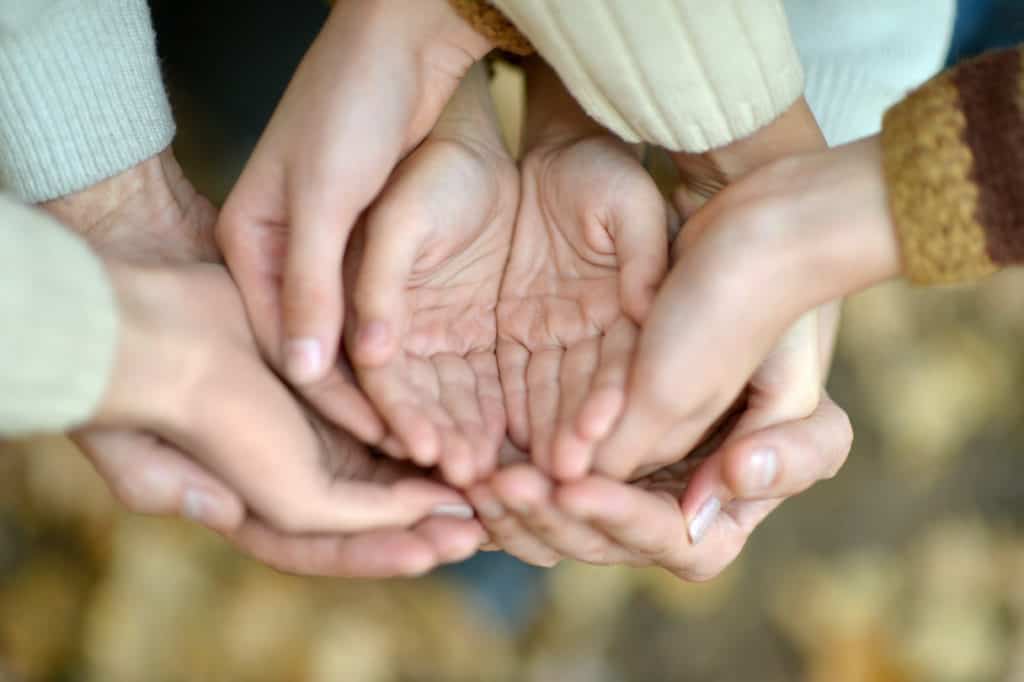
Physical Help
Similar to many of the suggestions listed for helping out during a family’s hospital stay, a great way to show support after an infant’s death is by providing a reprieve from the everyday burdens of life.
At the top of this list: food. Bringing meals to the family alleviates the need for them to prepare food, think about what to eat, or buy ingredients (and therefore go out in public). When you drop off dinner, consider bringing some breakfast foods or snacks. It doesn’t have to be fancy.
We were given extras such as frozen pizzas and waffles, special snacks for Q, baked oatmeal, eggs, and Lara bars. If possible, bring prepared food in disposable containers so the family doesn’t need to keep track of returning them. There’s nothing wrong with dropping off take-out or having a meal delivered, either.
Other ways to lift the burden of normal life tasks include childcare, housework, and errands. As previously mentioned, any seemingly menial task can be a way to provide very real support. Suggestions include:
- Pick up older children for a play date
- Take the dog for a walk
- Do a load of laundry
- Unload the dishwasher
- Take out the trash
- Mow the lawn
- Go grocery shopping
- Drop off a cup of coffee
Depending on how close you are to the grieving parents, there could be other ways to provide this type of assistance. Perhaps the mom has to brave the department store to find a postpartum-friendly dress to wear to her baby’s funeral – and she has to walk by the baby clothes when she’s there. She needs a compassionate friend to accompany her on that trip (one who is ok with sobbing in the middle of Kohl’s – been there, done that).
Maybe the parents need someone else to do the physical work of putting away items from the baby’s nursery while they just sit and cry. There is no lack of ways to creatively show practical love to a family going through this unique grief.
Emotional Help
While everyone experiences differing levels of empathy, sympathy, and compassion, there are some definite ways to offer emotional support to a family going through the death of a baby. It’s pretty important to realize that there will never be magical words that will soothe this heartache.

Especially in the immediate aftermath of trauma and death, words can quickly become hurtful even when spoken with the best of intentions. Often, the most healing and helpful thing to do is to just sit and cry. Seriously. It seems awkward at first, and eventually words will be exchanged, but they don’t need to be the focus of a visit.
For someone who has just lost their precious baby, merely having a friend come and share in the depths of their grief speaks volumes. It expresses that this baby is still loved and cherished, and that their life is full of worth.
This is a prime example of a time to remember those concentric circles of grief – the grieving person might just need someone to help absorb the weight of their emotional burden. You can do that by listening well, reflecting their feelings, and when appropriate, sharing how you miss their little one too.
What isn’t appropriate is spending a lot of time talking about how hard the experience has been on you personally. It very well may be – you just need to find someone else to process through those feelings in a separate space.
Written Words
There is also a lot to be said for the power of the written word. Sympathy cards exist for a reason – even if many seem to be filled with cliches, a handwritten personal message is a treasure.
The advantage of writing a card is the ability to plan what is going to be said carefully. It also allows the grieving person to have a collection of meaningful and comforting words to refer to on especially difficult days. I have read and re-read the cards that we were sent, crying through the process as I recall just how many people cared so well for our family.
I think of a few close friends who didn’t stop with just one card – one dear friend several states away sent a supportive note every few months for at least a year. Another friend would slip notes to me at various times, simply encouraging my faith and remembering my grief with me.

Say Their Name
Never be afraid of saying the baby’s name or mentioning them in a conversation, thinking that you’ll suddenly make the grieving parent sad because you reminded them of their dead baby. (This goes for the long term, too.)
You can never bring them sadness by remembering their baby. It will warm their heart to hear something like “I was thinking of ____ today when I saw this animal that you had decorated their nursery with” or “I heard a song that reminded me of _____ and wanted you to know I’m praying for you.” Those simple moments can even be shared with a quick text message, but they convey a continued remembrance that means the world to a parent with physically empty arms.
Monetary Help
There isn’t really a delicate way to put this: money helps. It seems a little cold at first, to “throw money at a problem” but there are many ways in which financial provision can show deep caring.
There may be a specific fund set up for the family through a fundraising website, or they may have a PayPal address or similar way to easily transfer funds to them. Good old fashioned cash or checks work, too.
To illustrate some ways in which monetary donations can assist a family going through the loss of a baby (whether followed by a NICU stay or not), I’ll share some ways that we were blessed and how those funds were used. First of all, funerals are very expensive. So are caskets. And flowers. And burial plots. And headstones. Everything related to that industry comes with an understandable price tag.
We were incredibly fortunate that a local funeral home offers very deeply discounted services for families who have lost children. Similarly, a local cemetery had much more affordable pricing for these situations.
But even with those discounts (that not everyone in similar circumstances receives) the dollars add up very quickly. Knowing that we had a level of financial provision allowed us to make decisions like holding Edison’s visitation in the evening so that more people would be able to attend. We were able to pick out a casket that we felt honored the beautiful, tiny person that would be placed inside it.
In addition to the expenses related to Edison’s funeral, money that we were given was used in many ways both during his NICU stay and after we arrived back home. Because the hospital at which Edison was born was in a city about an hour away from our home, Kyle and I stayed at the local Ronald McDonald House (say what you will about McDonald’s food, that charity is priceless.).
However, our extended family members still needed places to stay, and we all had to eat. Many nights of hotel stays for family were covered for us, and we were given cash and gift cards to local restaurants for meals.
Money even went toward buying me pants to wear that didn’t hurt my new C-section scar. Then, in the hubbub of trying to plan a funeral and pick out everything necessary for burial, we used plenty more food gift cards as we drove from place to place. We were also able to use donated money to pay down some of the medical bills from Edison’s time in the NICU.
Sometimes families also suggest that donations be made in memory of their baby to a specific ministry, organization, or cause. Those gifts are always greatly appreciated, and can also make for a meaningful way to remember the baby’s birthday or other special occasions in the coming years.
Other Creative Gifts
Related to monetary gifts are other types of gifts – here’s a quick smattering of other gifts we gratefully received:
- Snacks
- Comfy leggings for postpartum recovery
- C-section scar cream
- Cards to write thank-you notes to nurses
- A journal and pens
- Photo frames and prints
- Lip balms/comfy socks/hair clips
- Blankets (made for Edison)
- Pumping supplies
Like any of the other ways to show a family support, there will be plenty of opportunities for creativity. What will speak to this particular family and what will meet their unique needs? The answer to that question will vary for every different circumstance, but a wonderful thing about showing love to people is that there are so many ways to do it well.
In the end, there is some truth to the saying “it’s the thought that counts” – when that thought is put into action and results in a show of gentle, selfless support.
Supporting Grieving Families: It’s All About Love
I hope that it’s obvious that no one person will be expected to show love and support in all of these ways. As I reflected on the various ways that we were supported after losing Edison, it struck me that there are clear parallels to the 5 Love Languages.
Everyone has a way that they are uniquely wired to share love, and none of those ways are ultimately right or wrong – it takes all types to have the fullest expression of love. So what is your natural bent? Are you a words of affirmation type? Maybe you are the one to buy an entire pack of note cards and send them full of encouragement every few months. Do you enjoy picking out the perfect gift? Maybe you get to show love by giving a grieving mom that little thing that you know will bring her a smile even in the midst of the hard. Or perhaps acts of service is your style, so you drop off a meal and unload the dishwasher while you’re at it. You get the picture.
A Note about Babies and Bellies
Due to the nature of baby loss, it frequently occurs that family members or friends of the bereaved parents are either pregnant or have new babies. Obviously, this can be a touchy circumstance to navigate.
While a grieving mother or father would never wish the pain of loss onto someone else, that does not negate the fact that seeing a pregnant mother’s swelling belly or hearing a newborn’s tiny cry can understandably sting.

If you find yourself in the situation of being pregnant or having a newborn when a friend loses a baby, it’s usually best to be as compassionately open as possible. Give the grieving parents the space they need by being extra-communicative.
It might seem counter-intuitive, but allowing them to make the choice about what they can handle respects their boundaries instead of assuming what they do or do not have the ability to process on any given day.
Examples of these types of extra communication would include:
- Being gentle when announcing a new pregnancy (including telling them privately so they aren’t blindsided at a big family gathering or find out over social media, etc)
- Inviting them to baby showers with a note that recognizes the potential emotional difficulty of the celebration (“I know this may be hard for you right now, so please do not feel obligated to attend – but you are important to me, so you’re welcome to come if you feel up to it!”)
- Asking if they would like to see or hold a new baby with the understanding that the answer may vary day to day.
The extra effort that allows the bereaved parents to make these kinds of decisions ultimately communicates that you care about their tender hearts and you want to honor their grieving process. It is a gift of selflessness that will go a long way in bridging the awkward situation, and will be much appreciated by the grieving family.
Coming Soon- Longer Term Support for Grieving Families going through Infant Loss
I hope these suggestions and thoughts are able to give some guidance in how to support grieving families going through infant loss. The death of a baby is always difficult, and being surrounded by a loving community makes a world of difference in the healing process.
If you’d like a simple gift that you can offer (even email) to a grieving friend, you can put your email in the box below and I’ll send you some Scripture cards right to your inbox.


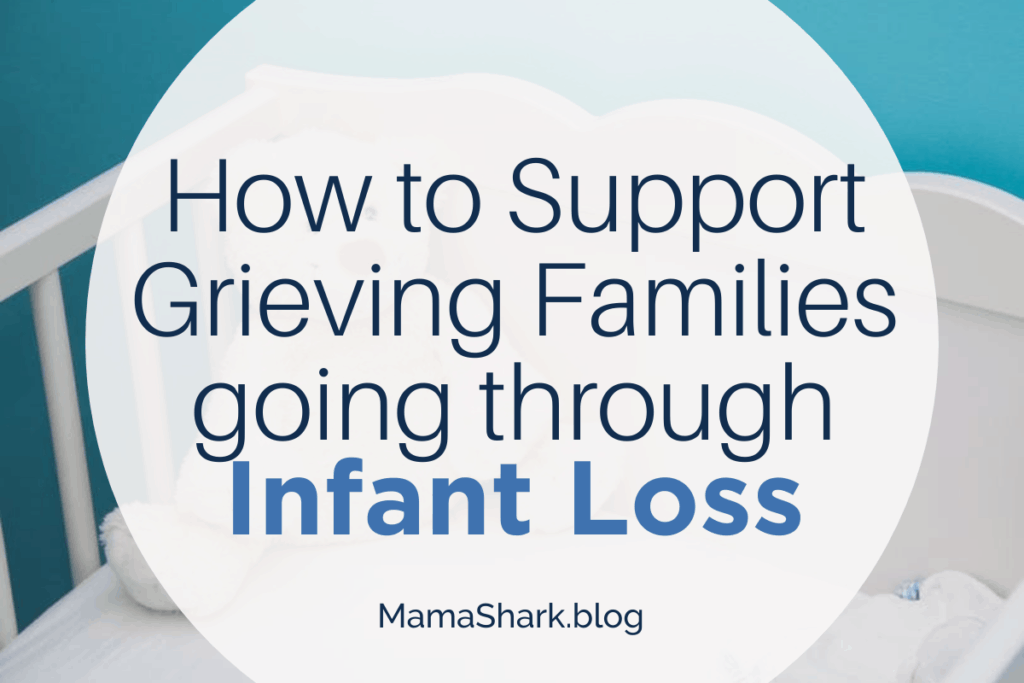
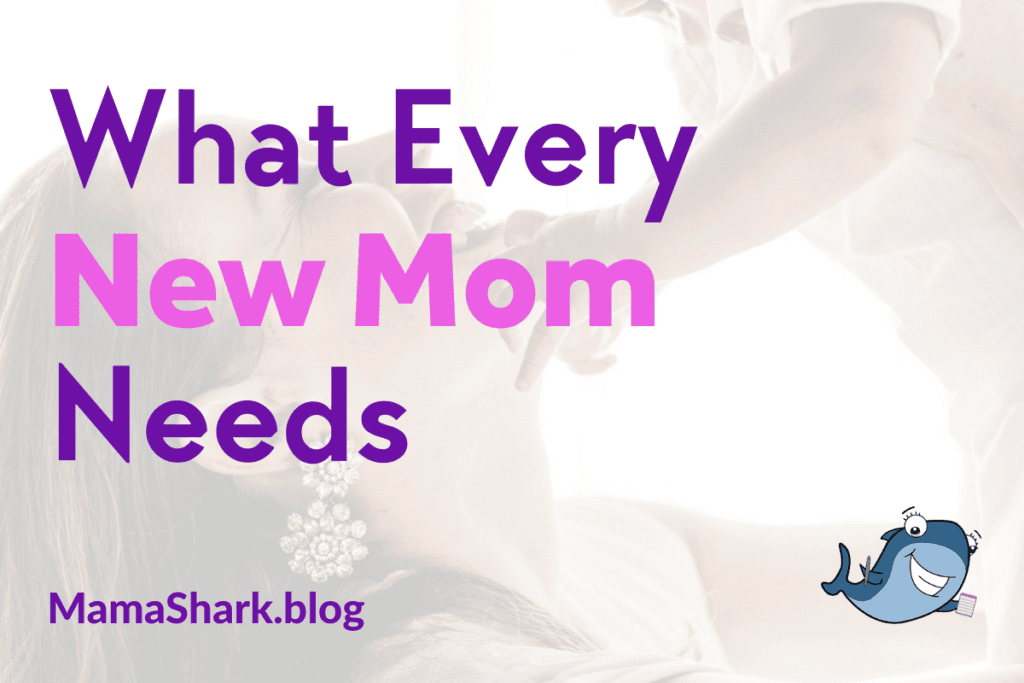

Pingback: The Benefits of a Birth Doula! - Mama Shark
Pingback: Edison's Story: Hope in the Midst of Infant Loss - Mama Shark
Pingback: My List of 100 Simple Things that Make Me Happy- Mama Shark
Thank you for sharing your ideas and insights. I want to share them with the ladies at our church in the loss of a young mother losing her baby boy at full term.